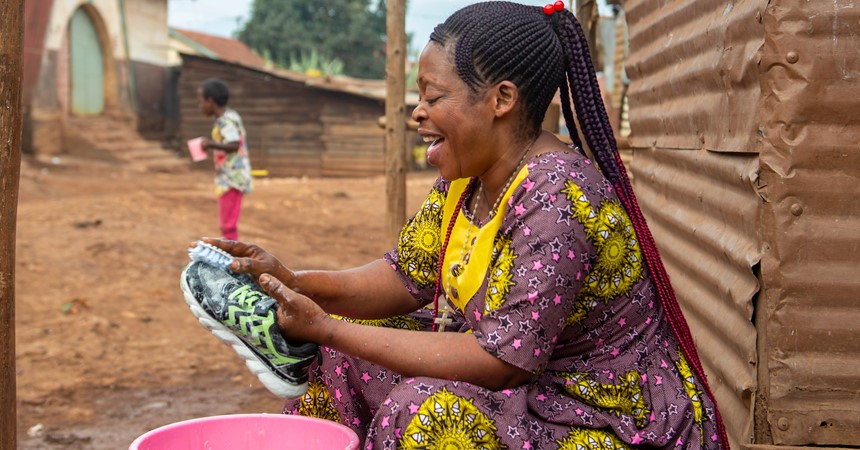Women and girls, particularly those living in poverty, consistently face gender discrimination, inequality and economic hardship. This year alone, there are estimated to be 388 million women and girls worldwide living in extreme poverty (UN Women, 2022).
In the Democratic Republic of Congo (DRC), the cycle of poverty continues when women have no choice over their life decisions. Ongoing conflict, limited access to education and gender-based violence are all contributing factors to the lack of autonomy in their lives.
Caritas Australia’s partners in the DRC have been implementing programs to help women and girls break the cycle of poverty, secure employment and income, and create a brighter future for themselves and their communities.
In recent decades, a staggering number of children have been violated of their rights and used as child soldiers. Rosalie was only 14 years old when she had to drop out of school due to the financial constraints of her family. She had little options and became a child soldier.
In the army, Rosalie found herself forced to transport munitions to soldiers on the battlefield while facing the constant threat of violence inside the military camp. She had to continue to work as a soldier, even after she married and had children because she had no other option – and it was the only life she knew.
“I was in the battlefield with my baby on my back,” Rosalie recalls. “I walked with a child in my left hand, a box of ammunition on my head and another child on my back. I also had a weapon on my right shoulder. The chief commander had no mercy on me, even though I had my baby on my back.”
When Rosalie was finally demobilised from the army after six years, she was eager to start a new life, free from violence. But with her childhood and education cut short, she had missed out on developing skills that would help her to find secure employment. She struggled to earn a sustainable income to provide food for her children. There was also prejudice towards excombatants in the community and she struggled to settle into ‘normal’ life.
Rosalie was determined to turn her life around and set a new path for herself and her family. She joined the Protection & Re-Integration of Ex-Combatants program, supported by Caritas Australia, and its local partner organisations, Catholic Agency for Overseas Development (CAFOD) and Caritas Bukavu. Through the program, she gained essential skills in generating an income while gaining a sense of belonging and community spirit.
“I can eat, dress, maintain my health and help others. My children study and manage to eat twice a day,” Rosalie says. “The program allowed me to break out of my ways of just thinking about myself and I have learnt to work hand-in-hand with other members of the community. Really, there is more joy in sharing with others.”
Thanks to the generosity of Caritas Australia supporters, along with the Australian Government through the Australian NGO Cooperation Program (ANCP), over 2500 people have benefitted from this program so far. Rosalie has become an entrepreneur and a respected community leader. She is helping other women to save and to start up their own businesses.
“May the Australian people continue to help others as well, so that they can also take care of themselves,” Rosalie says. “A really big thank you.”
Since 2013, our dedicated Women for the World community have made remarkable strides, changing countless lives of women in poverty worldwide. Donate
today to help women and girls around the world who are facing conflict and violence.
Follow mnnews.today on Facebook.























































































